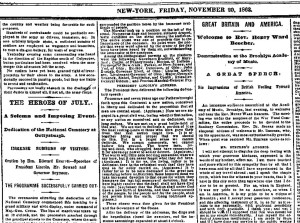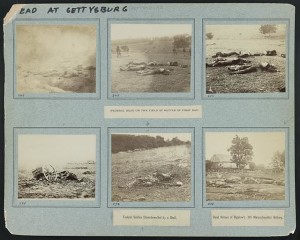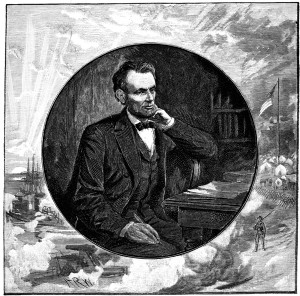Edward Everett gave the longer speech at Gettysburg – by about two hours. President Lincoln’s remarks at the cemetery dedication made it on the front page of The New-York Times on November 20th next to three columns (and counting) of oratory by another great speech-giver, Reverend Henry Ward Beecher. The proceeds of Reverend Beecher’s Brooklyn speech on U.S.-British relations were donated to the Sanitary Commission. The Times found enough space for Edward Everett’s speech on page two.
From The New-York Times November 20, 1863:
THE HEROES OF JULY.; A Solemn and Imposing Event. Dedication of the National Cemetery at Gettysburgh. IMMENSE NUMBERS OF VISITORS. Oration by Hon. Edward Everett–Speeches of President Lincoln, Mr. Seward and Governor Seymour. THE PROGRAMME SUCCESSFULLY CARRIED OUT.
The ceremonies attending the dedication of the National Cemetery commenced this morning by a grand military and civic display, under command of Maj.-Gen. COUCH. The line of march was taken up at 10 o’clock, and the procession marched through the principal streets to the Cemetery, where the military formed in line and saluted the President. At 11 the head of the procession arrived at the main stand. The President and members of the Cabinet, together with the chief military and civic dignitaries, took position on the stand. The President seated himself between Mr. SEWARD and Mr. EVERETT after a reception marked with the respect and perfect silence due to the solemnity of the occasion, every man in the immense gathering uncovering on his appearance.
The military were formed in line extending around the stand, the area between the stand and military being occupied by civilians, comprising about 15,000 people and including men, women and children. The attendance of ladies was quite large. The military escort comprised one squadron of cavalry, two batteries of artillery and a regiment of infantry, which constitutes the regular funeral escort of honor for the highest officer in the service.
After the performance of a funeral dirge, by BIRGFIELD, by the band, an eloquent prayer was delivered by Rev. Mr. STOCKTON, as follows:
O God, our Father, for the sake of the Son, our Saviour, inspire us with thy spirit, and sanctity us to the right fulfillment of the duties of this occasion. We come to dedicate this new historic centre as a National Cemetery. If all the Departments of the one Government thou hast ordained over our Union, and of the many Governments which Thou has subordinated to the Union be there represented; if all classes, relations and interests of our blended brotherhood of people stand severally and thoroughly apparent in Thy presence, we trust it is because Thou hast called us, that Thy blessing awaits us, and that Thy designs may be embodied in practical results of incalculable, imperishable good. And so with thy holy Apostle and with the Church in all lands and ages, we unite in the ascription: Blessed be God, even the Father of Our Lord Jesus Christ, the Father of Moses, and the God of all comfort, who comforteth us in all our tribulation, that we may be able to comfort them which are in any trouble by the comfort wherewith we ourselves are comforted of God. In emulation of all angels, in fellowship with all saints, and in sympathy with all sufferers, in a remembrance of Thy works, in reverence of Thy ways, and in accordance with Thy word, we love and magnify Thy infinite perfections, Thy creative glory. Thy redeeming grace, Thy providential goodness, and the progressive, richer and fairer development of thy supreme, universal and everlasting administration. In behalf of all humanity, whose ideal is divine, whose first memory is thy image lost, whose last hope is thy image restored; especially in behalf of our own nation, whose position is so peerless, whose mission is so sublime, and whose future is so attractive; we thank Thee for the unspeakable patience of thy compassion and for the exceeding greatness of thy loving kindness. In contemplation of Eden, Calvary and Heaven, of Christ in the God on the cross, and on the throne — nay, more — of Christ as coming again in all-subduing power and glory; we gratefully prolong our homage by this altar of sacrifice, on this field of deliverance, on this mount of salvation, within the fiery and bloody line of these mountains and rocks, looking back to the dark days of fear and of trembling, and the rapture of relief that came after, we multiply our thanksgivings and confess our obligations to renew and perfect our personal and social consecration to thy service and glory. O, had it not been for God! for our enemies, they came unresisted, multitudinous, mighty, flushed with victory and sure of success; they exalted on our mountains; they reveled in our valleys they feasted, they rested, they slept, they awakened, they grew stronger, prouder and bolder every day; they spread abroad, they concentrated here; they looked beyond this horizon to the stores of wealth, to the haunts of pleasure and the seats of power in our Capital and chief cities; they prepared to cast the chain of Slavery around the form of freedom, and to bind life and death together forever. Their premature triumph was the mockery of God and man. One more victory, and all was theirs. But behind these hills was heard the feebler march of a smaller but still a pursuing host; onward they hurried, day and night, for their country and their God; footsore, wayworn, hungry, thirsty, faint, but not in heart; they came to dare all, to bear all, and to do all that is possible to heroes. At first they met the blast on the plain, and bent bebefore it like trees; but then led by Thy hand to the hills, they took their stand on the these rocks, and remained as firm and immovable as they. In vain were they assaulted; all art, all violence, all desperation failed to dislodge them. Baffled, bruised, broken, their enemies retired and disappeared. Glory to God for this rescue! But, Oh! the slain, in the freshness and fullness of their young and manly life! with such sweet memories of father and mother, brother and sister, wife and children, maiden and friend. From the coasts beneath the Eastern star; from the shores of Northerm lakes and rivers; from the flowers of the Western prairies; from the homes of the midway and the border, they came here to die for us and for mankind! Alas How little we can do for them! We come with the humility of prayer, with the pathetic eloquence of venerable wisdom, with the tender beauty of poetry, with the plaintive harmony of music, with the honest tribute of our Chief Magistrate, and with all this honorable attendances; but our best hope is in Thy blessings. O Lord, Our God, bless us. O, Our Father, bless the bereaved, whether absent or present Bless our sick and wounded soldiers and sailors. Bless all our rulers and people. Bless our army and navy. Bless the efforts to suppress this rebellion, and bless all the associations of this day, and place, and scene, forever. As the trees are not dead, though their foliage is gone, so our heroes are not dead though their forms have fallen. In their proper personality they are all with thee, and the spirit of their example is here. It fills the air, it fills our hearts, and as long as time shall last it will hover in these skies and rest on these landscapes, and pilgrims of our own land, and of all lands, will thrill with its inspiration, and increase and confirm their devotion to liberty, religion and God.
Mr. EVERETT then commenced the delivery of his oration, which was listened to with marked attention throughout. [The oration of Mr. EVERETT will be found on our second page.]
Although a heavy fog clouded the heavens in the morning during the procession, the sun broke out in all its brilliancy during the Rev. Mr. STOCKTON’s prayer and shone upon the magnificent spectacle. The assemblage was of great magnitude, and was gathered within a circle of great extent around the stand, which was located on the highest point of ground on which the battle was fought. A long line of military surrounded the position taken by the immense multitude of people.
The Marshal took up a position on the left of the stand. Numerous flags and banners, suitably draped, were exhibited on the stand among the audience. The entire scene was one of grandeur due to the importance of the occasion. So quiet were the people that every word uttered by the orator of the day must have been heard by them all, notwithstanding the immensity of the concours.
Among the distinguished persons on the platform were the following: Governors Bradford, of Maryland; Curtin, of Pennsylvania; Morton, of Indiana; Seymour of New-York; Parker, of New-Jersey and Tod, of Ohio; Ex-Gov. Dennison, of Ohio: John Brough, Governor Elect, of Ohio; Charles Anderson, Lieutenant-Governor of Ohio; Major-Generals Schenck, Stahel, Doubleday, and Couch; Brigadier General Gibbon; and Provost-Marshal-General Fry.
PRESIDENT LINCOLN’s ADDRESS.
The President then delivered the following dedicatory speech:
Fourscore and seven years ago our Fathers brought forth upon this Continent a new nation, conceived in liberty and dedicated to the proposition that all men are created equal. [Applause.] Now we are engaged in a great civil war, testing whether that nation, or any nation so conceived and so dedicated, can long endure. We are met on a great battle-field of that war. We are met to dedicate a portion of it as the final resting-place of those who here gave their lives that that nation might live. It is altogether fitting and proper that we should do this. But in a larger sense we cannot dedicate. We cannot consecrate, we cannot hallow this ground. The brave men, living and dead, who struggled here have consecrated it far above our power to add or detract. [Applause.] The world will little note nor long remember, what we say here, but it can never forget what they did here. [Applause.] It is for us, the living, rather to be dedicated here to the refinished work that they have thus so far nobly carried on. [Applause.] It is rather for us to be here dedicated to the great task remaining before us that from these honored dead we take increased devotion to that cause for which they here gave the last full measure of devotion; that we here highly resolve that the dead shall not have died in vain; [applause] that the Nation shall under God have a new birth of freedom, and that Governments of the people, by the people and for the people, shall not perish from the earth, [Long continued applause.]
Three cheers were then given for the President and the Governors of the States.
After the delivery of the addresses, the dirge and the benediction closed the exercises, and the immense assemblage separated at about 4 o’clock.
About 3 o’clock in the afternoon, the Fifth New York regiment of heavy artillery, Col. MURRAY, was marched to the temporary residence of Gov. SEYMOUR, where they passed in review before the Governor, presenting a handsome spectacle. Upon the conclusion of this ceremony, which attracted quite a crowd of sight-seers. Gov. SEYMOUR presented a handsome silk regimental standard to the regiment, accompanying the gift with the following speech: …
A subscription of $280 was made by the Marshals attending these ceremonies, to he devoted to the relief of the Richmond prisoners.
In the afternoon, the Lieutenant-Governor elect of Ohio, Col. ANDERSON, delivered an oration at the Presbyterian Church.
The President and party returned to Washington at 6 o’clock this evening, followed by the Governors’ trains. Thousands of persons were gathered at the depot, anxiously awaiting transportation to their homes; but they will probably be confined to the meagre accommodations of Gettysburgh till tomorrow.
So the opening prayer was even longer than the now famous address by Mr. Lincoln.
The Lincoln picture is from U.S. History Images




![National Cemetery, Gettysburg, Pa. (by Simon & Murnane c.1913; LOC: PAN US GEOG - Pennsylvania no. 87 (E size) [P&P])](https://www.bluegrayreview.com/wp-content/uploads/2013/11/6a09510r-1024x161.jpg)